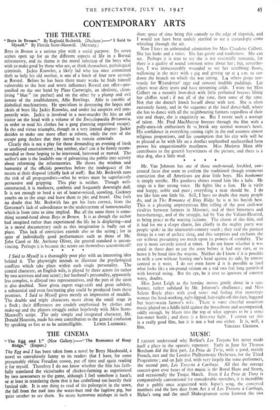CONTEMPORARY ARTS
THE THEATRE
" Boys in Brown." By Reginald Beckwith. (Duchess.)---“I Said to Myself." By Florida Scott-Maxwell. (Mercury.)
Boys in Brown is a serious play with a social purpose. Its seven scenes open up for us the different aspects of life in a Borstal reformatory, and its theme is the moral infection of the boys who wish to make good by those who are, or think themselves, pathological criminals. Jackie Knowles, a likely lad who has once committed theft to help his old mother, is one of a batch of four new arrivals at Borstal. Before he has been there many weeks he finds himself vulnerable to the best and worst influences Borstal can offer—per- sonified on the one hand by Plato Cartwright, an idealistic, clean- living " blue " (or prefect) and on the other by a plump and evil inmate of the establishment, Alfie Rawlings. Alfie is capable of diabolical machinations. He specialises in destroying the hopes and ideals of boys like Jackie Knowles, and under his auspices evil tem- porarily wins. Jackie is involved in a near-murder (he hits an old visitor on the head with a volume of the Encyclopaedia Britannica, in order to steal his clothes for a gang planning organised escape). In the end virtue triumphs, though in a very limited degree: Jackie decides to make one more effort at reform, while the rest of the escape gang declare that they intend to remain criminals.
Clearly this is not a play for those demanding an evening of fresh or unalloyed entertainment ; but neither, alas! can it be firmly recom- mended to those hoping to be interested, harrowed or moved. The author's aim is the laudable one of galvanising the public into activity about reforming the reformatories. He shows the wisdom and humanity of the officials powerless before the inadequacy of the means at their disposal (chiefly lack of staff). But Mr. Beckwith runs the risk of all propagandists—what he writes must be superlatively persuasive and gripping. This play is neither. Though well- constructed, it is mediocre, synthetic and frequently downright dull. It is not enough to herd a set of hoarse-voiced, scowling, Cockney youths on to the stage and leave them to plot and brawl. One feels no doubt that Mr. Beckwith has got his facts correct, from the Governor's lack of subordinates to the undercurrent of homosexuality which is from time to time implied. But all the same there is some- thing second-hand about Boys in Brown. It is as though the author had imagined rather than experienced the life he is displaying—and in a moral documentary such as this imagination is badly out of place. This lack of conviction extends also to the acting ; for in spite of individually good performances such as those of Mr. John Carol or Mr. Anthony Oliver, the general standard is uncon- vincing. Perhaps it is because the actors are themselves unconvinced? * * * * I Said to Myself is a thoroughly poor play with an interesting idea behind it. The playwright intends to illustrate the psychological conflicts which •take place within each single personality. The central character, an English wife, is played by three actors (or rather by two actresses and one actor) ; her husband's personality, apparently less complex, is allotted two representatives, and the part of the siren is also doubled. Now given expert stage-craft and great subtlety, a substantial and even fascinating play could be produced from these premises. I Said to Myself gives merely an impression of muddle. The double and triple characters move about the small stage in a flock ; their differences are crudely emphasised by clothes and make-up and the players struggle rather hopelessly with Miss Scott- Maxwell's script. The only simple and integrated character, Mr. Donald Houston, made his own contribution to the general confusion
by speaking so fast as to be unintelligible. LEWIS LADBROKE.


































 Previous page
Previous page